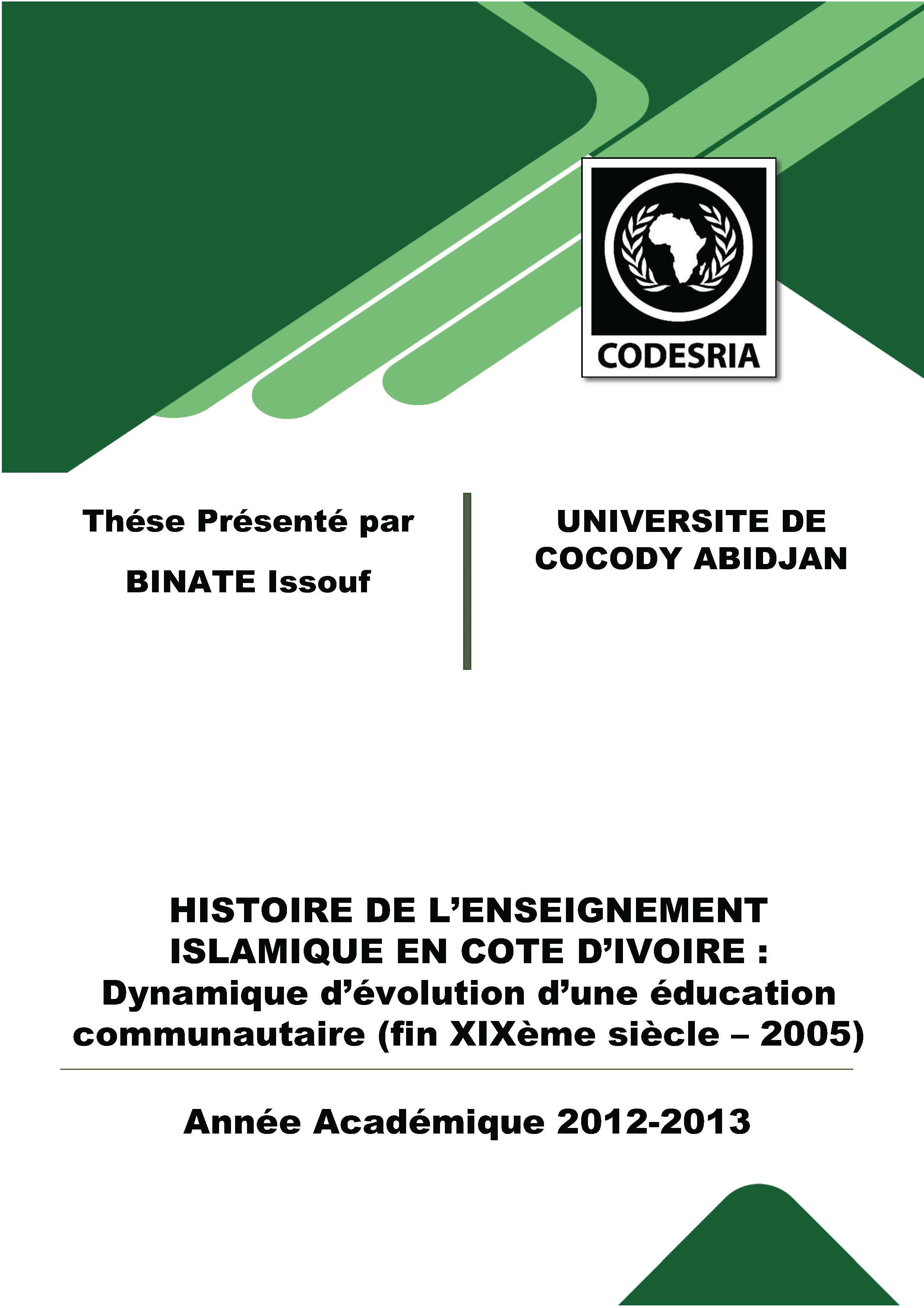Histoire de l'enseignement islamique en Côte d'Ivoire : dynamique d'évolution d'une éducation communautaire, fin XIXème siècle - 2005
Keywords:
History , Islam, Muslim, Education , Confessional school , Convention , AssociationSynopsis
informal. Islamic education, belonging to the second group, is numbered among the precursors of the country’s
educational system. Under the authority of individuals or communities rather than the State, Islamic educational establishments have persisted. They entered the educational scene as traditional Islamic schools or Dougoumakalan (in the Malinké language) before undergoing changes as medersas under the colonial administration. In spite of such changes through which they have come to resemble the format of public schools, Islamic educational establishments have continued to progress since the country’s independence under the supervision of the Ministry of the Interior. Such a situation, marginalizing an important proportion of school age Muslim youth, would lead to the creation of Islamic associations. From 1954 to the decade beginning in 1980, several organizations including the national branch of Cultural Muslim Union (CMU), the Koranic Teachers Association (CTA) and the High Islamic Council (HIC) engaged themselves in the struggle for the recognition of Islamic schools der. All those initiatives failed. However, they paved the way for talks between the government and the associations in the multiparty era. With the liberalization of political life, the 1980s witnessed the renewal of the debate over the problem of Islamic education. Thus, under the aegis of the National Islamic Counsel (NIC), negotiations undertaken with government successfully led to the signing of an agreement concerning Islamic education on December 2, 1993.Tbis new ruling allowed medersas to move out of the shadows and join the ranks of Catholics and Protestants denominational schools. However, more than a decade after implementation of this agreement, the appearance of the Islamic educational system appearance is still far from brilliant.
Downloads
References
- BA (Hampaté Amadou), « La tradition vivante », in KI-ZERBO (Joseph) (dir), Histoire générale de l’Afrique 1. Méthodologie et préhistoire africaine, Paris, UNESCO, 1980, pp191-230.
- BEAUD (Michel), L’art de la thèse, Paris, La découverte, 2001, 195p.
- BIZIERE (J.M.) et VAYSSIERE (P.), Histoire et historiens, Paris, Hachette supérieure, 1995, 255p.
- BLOCH (Marc), Apologie pour l’histoire ou métier d’historien, Paris, Armand Colin, 1974, 167p.
- DIABATE (Henriette), Le Sannvi, sources orales et histoire : Essai de méthodologie, Abidjan, NEA, 1986, 188p.
- Dictionnaire Universel, Paris, 2ᵉ̀ᵐᵉ éd. AUPELF-EDICEF, 1503p.
- Encyclopedia Universalis, Corpus 10, Paris, SA, 1994, 1084p.
- Encyclopedia Universalis, Corpus 12, Paris, SA, 1994, 1051p.
- KI-ZERBO (Joseph) (dir), Histoire générale de l’Afrique 1. Méthodologie et préhistoire africaine, Paris, UNESCO, 1980, 863p.
- N’DA (Paul), Méthodologie de la recherche, Abidjan, EDUCI, 2002, 135p.
- NOIRIEL (Gérard), Qu’est-ce que l’histoire contemporaine ? Paris, Hachette supérieure, 1998, 255p.
- POIRRIER (Philippe), Aborder l’histoire, Paris, Seuil, 2000, 96p.
- UNESCO, La méthodologie de l’histoire de l’Afrique contemporaine : Documents de travail et compte rendu, Paris, UNESCO, 1984, 226p.
- VANSINA (Jan), De la tradition orale : Essai de méthode historique, Tervuren,
Musée royal de l’Afrique Centrale, 1961, 179p.
- ALEM (Jean Pierre), Le Proche Orient arabe, Paris, PUF, 1964, 128p (Que sait-je ? : 0819).
- ANOUMA (René – Pierre), Aux origines de la nation ivoirienne : 1893 – 1946, 2 volumes, Paris, L’Harmattan, 2006, 641p.
- BAULIN (Jacques), La politique africaine d’Houphouët, Paris, Eurafor-Presse, 1980, 215p.
- BAULIN (Jacques), La politique intérieure d’Houphouët, Paris, Eurafor-Presse, 1982, 255p.
- BINGER (Louis Gustave), Du Niger au Golfe de Guinée par le pays de Kong et le Mossi, Paris, Hachette, 1892, 416p.
- CISSE (Cheick Chikouna), Migrations et mise en valeur de la Basse Côte d’Ivoire (1920 – 1960) : Etude d’une dynamique régionale de mobilité de la main d’œuvre, Thèse unique de Doctorat, Université de Côte d’Ivoire, UFR : SHS, Histoire, Abidjan, 2008, 791p.
- CONSTANTIN (François), « Les relations politiques arabo-africaines contemporaines », in Mémoire du CERMAA, Paris, 1979, pp305-332.
- COQUERY (Vidrovitch Catherine), L’Afrique occidentale du temps des français colonisateurs et colonisés 1860-1960, Paris, La découverte, 1992, 460p.
- COTTEN (M.), col. Lamine DIABATE, « Odienné, deux siècles d’histoire », s.l, s.d, pp19-24.
- DADIE (Bernard), Carnet de prison, Abidjan, CEDA, 1984, 353p.
- DESCHAMPS (Hubert), Les religions de l’Afrique noire, Paris, PUF, 1970, 128p (Que sait-je ?:529).
- DIABATE (Henriette) (dir), Mémorial de la Côte d’Ivoire : Les fondements de la nation ivoirienne, tome 1, Abidjan, Ami, 1987, 290p.






